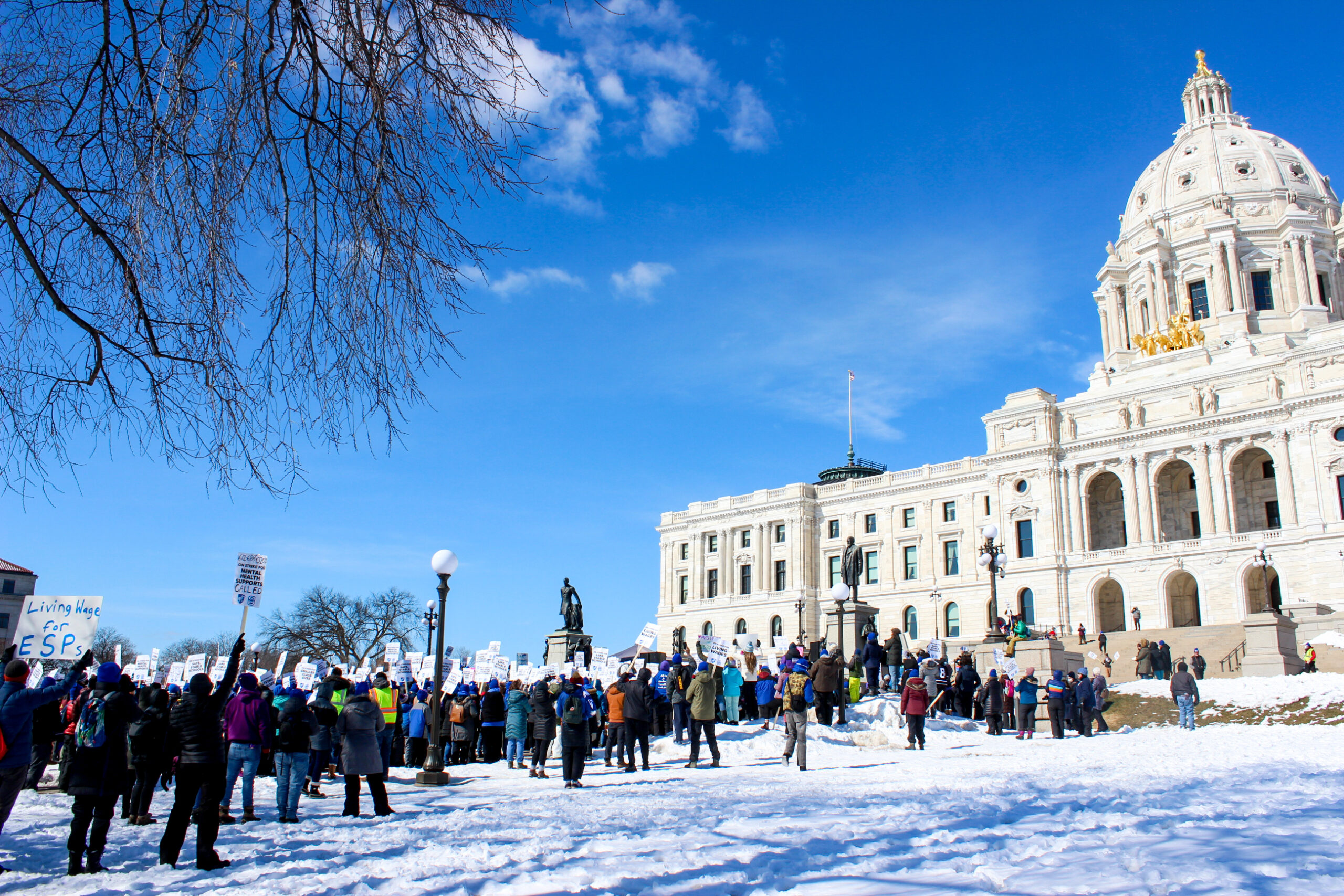
Minneapolis Federation of Teachers 59 at the Minnesota State Capitol while on strike in 2022.

Share
Catina Taylor has worked as a special educational assistant for the past 25 years in Minneapolis Public Schools. She’s a member of the Minneapolis Federation of Teachers 59 (MFT 59) and President of the Education Support Professionals (ESPs). In 2022, Minneapolis teachers went on strike for three weeks. Taylor was on the picket line—she remembers not being able to feel her feet in the cold. Although she looks back fondly on the “historic” strike, she adds that it was a financially difficult time for many members.
Going on strike is one of the most powerful tools workers have, but can be a difficult choice for workers to forgo weeks of pay in the hopes of making greater gains for the long term. However, Minnesota is currently one of a handful of states that may extend unemployment benefits to workers on strike. Local unions and allies are advocating for a bill that would allow striking workers to access unemployment benefits for strikes that last over one week.
“It would have been great to have unemployment insurance during that time because it would have given working people a little bit more power and a little bit more leverage.” Taylor explains. “So many families go without when we strike. But that’s the only power that we have as workers, to hold back our labor.”

Amie Stager
Minneapolis Federation of Teachers 59 at the Minnesota State Capitol while on strike in 2022.Taylor explains that the teachers relied on community donations to their strike fund so that members could continue to stay afloat during the three weeks without pay. She said, “Some of us were already living on poverty wages. But we took a chance because sometimes you just gotta take chances and take risks for what you believe.”
This is the first time this is being introduced to Minnesota, but is a part of a growing national trend. Advocates of the Minnesota bill are using the model of New York’s unemployment policy, which since its inception in 1935, allowed for striking workers to access unemployment. New Jersey included striking workers in their unemployment policy in 2018. In California, the bill was introduced and then vetoed due to an extreme budget deficit.
The bill is authored by Sen. Zaynab Mohamed in the Minnesota State Senate and Rep. Kaela Berg in the Minnesota House of Representatives. SEIU Minnesota, the Minnesota AFL-CIO, MFT 59, and other unions have pledged support.
This bill comes after Minnesota leading the way in worker protections in the region and nationally. In the 2023 legislative session, Minnesota’s workers won numerous gains including paid family and medical leave, banning captive audience meetings, the creation of a Nursing Home Workforce Standards Board, banning non-compete agreements, and protections for construction workers facing wage theft and misclassification.
North Star Policy Action published a report exploring the costs related to striking workers accessing unemployment benefits in Minnesota. The report states that from the period between 1993 and 2023, there were “only 22 strikes in Minnesota involving more than 1,000 workers” and that the majority of those strikes were settled within two weeks. The report emphasizes that strikes lasting more than one week are rare and would not come at a significant cost.
Advocates state that some of the most vocal opposition to the bill is coming from the Minnesota School Board Association, who say that the bill is not financially viable. Other notable dissenters include a coalition of non-union contractors, an industry where strikes are almost unheard of.
One spokesperson told Workday Magazine that the bill has not been included in an omnibus bill, indicating that the bill is unlikely to pass this session. However, advocates plan to continue lobbying to extend unemployment benefits for striking workers in the next legislative session.

